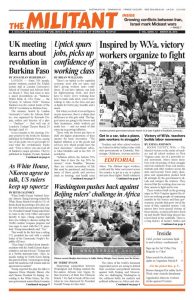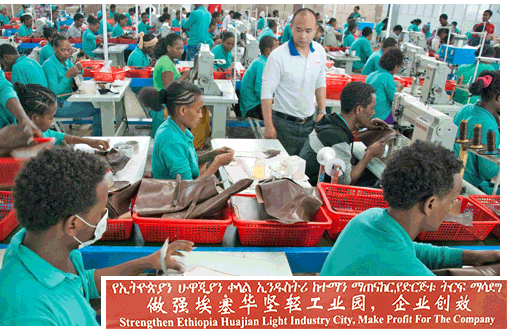Sharpening competition between Washington and Beijing marked the five-nation African tour begun by then Secretary of State Rex Tillerson March 7. He had to break off his visit when he was dismissed by President Donald Trump six days later.
The rulers of the world’s dominant imperialist power are acting to defend their economic and political interests against both Beijing and Moscow, who are challenging Washington in the cutthroat battle for markets and political influence in Africa and elsewhere around the world.
Tillerson met with government officials in Chad, Djibouti, Ethiopia, Kenya and Nigeria, all countries whose rulers are conducting military action against Islamist forces with Washington’s backing. These operations take place against the backdrop of sharpening class antagonisms on the continent built on developing capitalist economic and social relations there.
Prior to the trip, Tillerson said Washington’s approach to the continent “stands in contrast to China’s,” which he claimed “encourages dependency,” using “predatory loan practices” that “undercut their sovereignty.”
The propertied rulers in both Washington and Beijing compete to exploit the toilers of the continent. Both are driven to extend abroad their profit-driven assaults on working people at home. They seek fields of profitable capital investment to loot the continent’s natural resources and to market their exports. In so doing, they impose more debt bondage on the peoples of Africa — with ruinous consequences for working classes there.
Beijing tried to disrupt Tillerson’s efforts. At a joint press conference with Moussa Faki Mahamat, chair of the African Union Commission, a reporter from the China Global Television Network pressed him on reports that Trump called Africa a bunch of “s–hole countries.”
Contrary to claims in the liberal press that Tillerson’s tour was just a “fence-mending” operation to apologize for the U.S. president, Washington aimed to build on its increasing military collaboration with governments in a number of African countries. Over several administrations — Democratic and Republican alike — the U.S. rulers have sought to put down destabilizing threats to their interests.
Acknowledged U.S. troop deployment in Africa rose from some 6,000 last year to 7,500 today. Washington has doubled its forces in Somalia, where they operate alongside Somali troops combating al-Shabab terrorists. U.S. airstrikes there are increasing.
Kenyan President Uhuru Kenyatta told Tillerson that Washington should launch a “surge” against al-Shabab, which holds territory in the country’s rural areas. He also pressed for a review of the decision to withdraw all African Union troops, including Kenyan forces, from Somalia.
Tillerson met government leaders in Ethiopia, who have been a staunch military ally of Washington. The country is wracked with political instability, growing class antagonisms and tribal divisions. The rulers have been unable to find a replacement for Prime Minister Hailemariam Desalegn, who resigned in February, but hangs on while the struggle over his successor drags on.
Days before Tillerson’s arrival, strikes were organized across the Oromia region by opposition forces fighting a government-imposed state of emergency that restricts political activity.
This follows over two years of protests by people in Oromia against government seizure of farmers’ lands, high unemployment and suppression of political rights, where over 1,000 people have been killed. For years the governing coalition has been dominated by the Tigrayan People’s Liberation Front, which has sought to limit the influence of parties based on other tribal groups. Tigrayans make up only 6 percent of the country’s 100 million people.
Washington has begun construction of a new military base in Niger, where four U.S. special forces troops were killed in a 2017 military reconnaissance mission.
U.S. rulers challenged by Beijing
Chinese bosses replaced their U.S. counterparts as the largest traders across Africa in 2009. The big expansion of Chinese industrial production over the last 35 years has driven Chinese capitalists to seek markets and sources of raw materials abroad. As they’ve built new factories and large infrastructure projects in several African nations, they have drawn more toilers off the land and into the working class.
Chinese bosses are building roads and hospitals in the Democratic Republic of Congo in exchange for a 68 percent stake in Sicomines — a vast copper and cobalt mine — rather than asking for cash.
Alongside the Chinese-built rail line connecting Addis Ababa with the Red Sea port at Djibouti, thousands of Ethiopians work 13-hour days at the Chinese-owned Huajian shoe factory. Workers there interviewed by Deutsche Welle described the low wages and daily indignities they confront. Abu Ibrahim, a leather cutter at the plant, complained that the bosses constantly berate workers, pressing them to work faster. He said the bosses fired workers who tried to organize a union in 2015.
As the Chinese rulers expand their economic interests in Africa they have begun to establish a military footprint too. Last year Beijing opened its first military base in Africa, in strategically located Djibouti. In September Beijing assigned an additional 8,000 troops to participate in U.N. “peacekeeping” operations in Liberia, Sudan, the Republic of the Congo and in Mali, where they gain combat experience.


